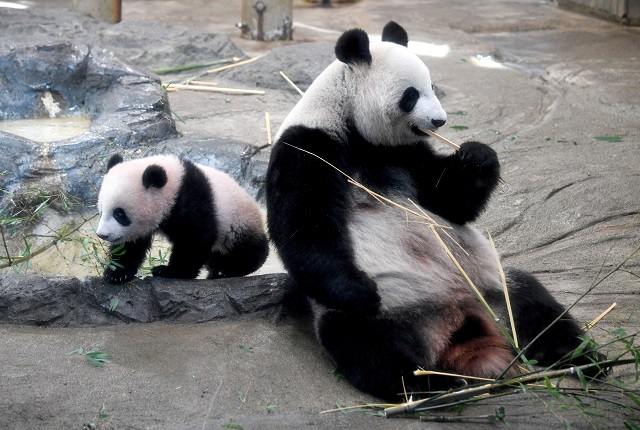
Chuang Chuang, a resident of the northern city's zoo since October 2003, arrived with female Lin Hui, where the pair lived in an air-conditioned enclosure.
The pair's mating habits - or lack of - became a source of relentless public intrigue, with Chuang Chuang put on a low-carb diet and shown video clips of panda's coupling in an attempt to spice up their sex drive.
After struggles to conceive, Lin Hui finally gave birth thanks to artificial insemination to Linping in 2009, spurring a widely-watched live 24-hour "Panda Channel".
Dismayed Thais woke up Tuesday to the news of Chuang Chuang's death.
Rare giant panda twins born at Belgian zoo
"He was so lovely," said Twitter user @Janekwb.
"Rest in peace, little bear."
Chiang Mai zoo director Wutthichai Muangmun said before his death, Chuang Chuang was doing what he liked best - eating bamboo.
"He was walking around, but staggered and fell to the ground," he told reporters.
Each panda was insured for up to 15 million baht ($490,000) under the agreement with China, he added.
On loan from Chengdu, the pair were a part of China's so-called "panda diplomacy", and were supposed to be returned in 2023.
Giant pandas are notorious for their low sex drive and are among the world's most endangered animals.
Their average life expectancy ranges from 15 to 20 year in the wild, but they can live up to 30 years in captivity, according to WWF.






1732177276-0/Copy-of-Untitled-(62)1732177276-0-270x192.webp)
1732177123-0/BeFunk_§_]__-(21)1732177123-0.jpg)
1732179136-0/Copy-of-Untitled-(63)1732179136-0-270x192.webp)

1732172224-0/Express-Tribune-(1)1732172224-0-270x192.webp)






COMMENTS
Comments are moderated and generally will be posted if they are on-topic and not abusive.
For more information, please see our Comments FAQ